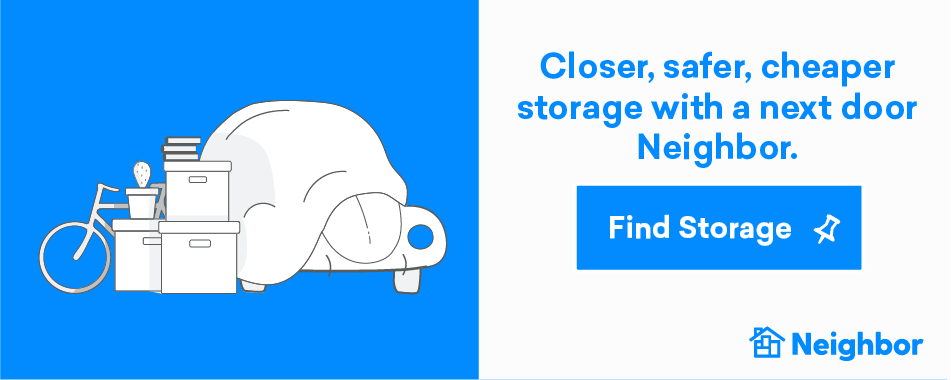Like ancient Greek philosopher Heraclitus said, change is the only constant in life. While life is full of small changes, we sometimes experience big changes that bring major stress and heartache. Four of these major life events are known in the storage industry as “the four D’s of storage”: death, divorce, dislocation, and downsizing.
Death
Losing a loved one is difficult. This tragic event can become even more painful in the days following the death of your loved one as you plan for funeral arrangements, legal business, and taking care of the estate. Consumer Reports offers a complete checklist of things to do when a loved one dies to help keep you on track during the aftermath of a tragedy. While taking care of official business, you can relieve some of the stress by having a safe place to store your loved one’s possessions until the estate is settled. Neighbor, a peer-to-peer storage community, can help you find the perfect last-minute storage space in an area close to you with a flexible month-to-month contract.
There is a good chance your loved one may already have a storage unit when they pass away. This means you will need to make decisions about what to do with the property in the unit and go through legal processes to obtain it. Below are some FAQs about what happens when a storage tenant dies.
What Happens to a Storage Unit if the Renter Dies?
Just because a storage tenant passes away doesn’t mean their rights pass away with them. Unless you have the codes and keys to get into the storage unit on your own, you will need to obtain some legal papers to access the unit. Management can’t unlock the unit for anyone unless they have an official death certificate and court letter.
Leasing Obligations After the Death of a Tenant
Settling an estate in court can take well over a month, meaning rent will need to be paid on the storage unit during that time. Management can place a lien against the unit and eventually auction off the contents if rent is not paid or if no family comes to claim the unit. After heirs take the desired possessions out of a unit, they can choose to continue paying rent on the unit, close the contract, or leave the unit to be auctioned off.
What About the Safety Deposit?
It is usually the person appointed by either the will or a court as the administrator of the unit who receives the safety deposit. If management can’t find the administrator, they will send the safety deposit to the deceased tenant’s last-known address for the remaining heirs and courts to deal with.
Renting a Unit for Someone Else
If you choose to continue renting the unit after your loved one has passed on, you will need to take over the contract and become the official tenant. Once your name is on the lease, you become responsible for monthly payments and the contents of the unit, even if it belongs to someone else.
Dealing with the death of a loved one is painful and requires a lot of responsibility. Give yourself time to grieve and take care of your emotional needs while you go about legalities and taking care of funeral arrangements. Renting storage space is a great way to take some of the stress off your shoulders during this difficult time.
Divorce
Divorce can be messy, so many people opt to use self storage to protect their assets until all the details of the divorce are finalized. Here are some reasons why you might want to invest in a storage unit during divorce:
- Simplicity. You may have to move out of your previous home, and hauling all your stuff around with you while you get settled again can be a major hassle. Avoid moving everything multiple times by sticking it all in storage.
- Fresh Start. Start life after separation with a clean slate. You don’t have to take all your old stuff with you to your new life. Put items you no longer want in storage until you’re ready to sell them.
- Avoiding Your Old Home. Take everything you’ll need, like seasonal items, and put them in storage to prevent having to return to your old home. This way you can avoid seeing your partner during the divorce and still have access to all your stuff.
Divorce Facts
The United States ranks 6th in the world for divorces with approximately one divorce occuring every 13 seconds. There are many reasons people get divorced–people change, times get hard, and everyone deals with things differently. Here is a list of the most common reasons people have for getting a divorce:
- Infidelity
- Financial disputes
- Lack of communication
- Differing views on religion
- Disagreements about children
- Different priorities in life
- Constant arguments
- Unmet expectations
- Lack of intimacy
- Not being ready for marriage
Storage for Divorces
No matter what the reason is, divorce is usually always difficult. Finding the best deal on storage is probably the last thing on your mind, and you definitely don’t want to spend time tracking down the perfect space for your stuff. Neighbor is here to help! You can browse listings in any area, and find the best storage space for you. Because Neighbor’s costs are usually half the price of other self storage, you can save a lot of money while getting the storage you need.
Dislocation
Dislocation happens a lot. In fact, there are thousands of people moving all over the country every day. Dislocation can be a choice or something completely out of your control. There are several reasons people end up moving: job loss, remodeling, relationship changes, downsizing, buying a house, getting out of a bad neighborhood, finding better schools, or even just for an adventure.
With all the added stress of starting a new job or trying to make a new life, packing everything and transporting it to your new home can seem daunting to say the least. Below are some ideas to help make your dislocation as painless as possible.
Moving Checklist
There are several important things you have to do when moving. Here is list of basic to-dos to remember before the big day.
- Transfer medical, school, and other records
- Schedule disconnect times for utilities
- Update your address with the post office, banks, credit card companies, insurance companies, cell phone and internet providers, etc.
- Book a moving company or truck rental
- Donate or throw away items you don’t want to take with you
- Organize and label moving boxes
- Research your new community
- Pack overnight bags of essential items
- Clean out your old home
Keep this checklist handy while you prepare to move so you don’t have to scramble to get things done at the last minute.
Moving Tips
When you look around at all the things you need to box up before moving day, you might wonder how you survived moving last time. Chances are you’ve acquired more stuff now which means even more work. Use these moving and packing tips to make the impossible task of moving a little easier.
- Declutter Before Your Move. When the last minute comes and you find you still have rooms full of items, the only feasible solution is to dump everything in boxes as quickly as possible. Do yourself a favor and get a head start sorting through items before you pack them. Take the time to go through each area of your home and sort your stuff into piles of keep, discard, and sell/donate. After that, get rid of the items you don’t want and pack the ones you want to keep. This will save you a lot of time later on and a lot of extra boxes you don’t need.
- Set Up a Moving Budget. Much like a shopping trip to your favorite store, you can end up spending way more money than you planned on when moving. The best way to avoid extra expenses is to set up a moving budget beforehand. Spend time researching moving companies and rentals to get the best deal, and leave room in your budget for any surprise expenses.
- Organize Your Boxes. Use colored tape or stickers to keep your moving boxes organized by room. This will make it easy for movers and helpers to know which room to unload each box at your new home. You can also write a brief list of what is in each box as you pack, so you’ll be able to find items you need without opening every single one.
- Start Packing Unused Rooms First. If you aren’t sure where to start packing, figure out which room in your home is used the least often and start there. Game rooms, guest bedrooms, attics, and basements are usually full of stuff you won’t need before moving. After you’ve packed up the rooms you aren’t using, start skimming nonessential items out of everyday rooms like decorations in your living room or extra dishes in your kitchen.
Storage Ideas
If your dislocation is sudden due to job loss or just a temporary thing due to remodeling, storage is a good way to keep your belongings safe while you work out your living situation. Below is a comparison of some common moving storage options available.
- Neighbor. Neighbor is the most flexible and inexpensive option for moving storage. You can choose between several storage sizes and features meaning you’ll only have to pay for what you need. Neighbor has storage spaces available in your own neighborhood, so you’ll always have convenient access to your stuff and won’t have to worry about making room for a big shipping container in your yard.
- PODS. Using PODS, you can choose between three different sizes of weather-proof containers. The stationary containers are dropped off at your home and then picked up and taken to a storage facility once you’ve packed them. PODS charges begin as soon as they drop off the container, so you’ll need to pack quickly if you want to save some money.
- Zippy Shell. Unlike other stationary storage containers, Zippy Shell offers two sizes of mobile city-friendly containers. These containers are great for people who live in apartments or on tight streets. After you’ve packed your container, Zippy Shell will take it to a storage facility for safekeeping.
- U-Pack. U-Pack offers only one size of storage container, but they allow you to reserve as many containers as you think you’ll need and only pay for the ones you use. Unfortunately this means that even if you only end up needing an extra half of a storage container, you’ll still have to pay the whole price. Unlike PODS, U-Pack gives renters three days to pack and unpack their items free of charge.
Moving Truck Tips
Renting and loading a moving truck yourself is a great way to save money, but the whole process can be tricky. Here are some tips to help you find the right truck, pack everything efficiently, and drive confidently.
- Select the Right Size. Choosing the best size of truck is critical to your move. If your truck is too small, you’ll either have to completely unload the truck and arrange for a bigger one or leave some of your items behind.If your truck is too large, your items will get tossed around and damaged during transportation. A 10’ truck is perfect for studios and one bedroom apartments, and a 14’-17’ truck will hold the contents of a 1,200 sq ft house. If you have a large home or a lot of stuff in your smaller home, you will want to consider a larger truck. Here is a complete guide to moving truck sizes.
- Watch Out for Hidden Costs. The quote you get when looking at moving trucks usually doesn’t include everything. You’ll need to plan for gas, late fees, and other costs that might be lurking when comparing quotes between companies. Find out what is included in the quote and what else you’ll be responsible for paying before you book a truck.
- Use Boxes to Pack Your Items. Avoid using bags and anything not square-shaped as much as possible when packing. Things like moving boxes and plastic totes are meant to be stacked and squared away, so you’ll have an easier time loading the truck if you stick to box-shaped containers.
- Wrap Loose Items. Anything not in a box needs to be wrapped to stay clean and protected during transport. Wrap picture frames and mirrors with bubble wrap, and drape blankets or other covers over furniture. You can never have too much padding, so be generous with your wrapping.
- Disassemble Furniture. Some furniture items like chairs, tables, and bookshelves need to be taken apart before being packed. Wrap furniture parts tightly in rugs or pads and keep hardware organized in plastic bags.
- Take Care of Refrigerators/Freezers. Before loading your fridge or freezer, you’ll want to let it defrost for at least 24 hours.Don’t tip these appliances on their side at any point during the loading and transporting process because it could damage the compressor. Throw a bag of coffee beans in before you load your fridge or freezer to prevent any unpleasant odors.
- Put Heavy Items on the Bottom. You should begin loading in tiers starting at the farthest end of the trailer. Put heavy boxes on the bottom and stack lighter items on top. Each tier, or row of boxes, should be close to the ceiling before you begin the next one.
- Fill All of the Space. Think of loading a moving truck like a giant jigsaw puzzle. Your items should be packed tightly with no gaps or holes. Any open spaces could cause your items to shift and get damaged during transport.
- Map Out Your Route Beforehand. The time to decide the best way to get to your new home isn’t once you’ve already pulled out of your driveway. Because moving trucks are heavy, slow, and full of all your earthly possessions, you’ll want to carefully select your route. Check the weather conditions along your route as well, so you can be prepared for any rain or snow storms.
- Drive Cautiously. A moving truck is heavier and bulkier than your average vehicle, so you need to take extra safety measures when driving one. Start braking sooner than you think you need to, and leave plenty of space between you and the vehicle in front of you. It’s better to be safe than sorry when you’re driving a vehicle you aren’t familiar with.
Movers
You could spend all that time and stress worrying about packing and driving a moving truck yourself, or you could hire professional movers to do it for you. Here is a brief look at some top local and long-distance moving companies.
Local Movers
- Rocky Mountain Movers – What started as a local piano moving company 40 years ago has become a full service moving company. These local Salt Lake City movers are known for their fast and efficient services and have a 4-star review on Yelp. And yes, they do an excellent job moving pianos.
- The Other Side Movers – This Salt Lake City moving company is part of a non-profit facility where felons, substance abusers, and others can learn to live productive lives again. Although the guys who show up to help you move might not look like typical movers, they are guaranteed to be the nicest and happiest movers you’ve ever had. Yelp users have given The Other Side Movers a 5-star review.
- Smart Move – These movers service Salt Lake City and surrounding areas. With punctual and efficient crew members and especially good packing services, Smart Move has earned its 5-star review on Yelp.
Long-Distance Movers
- United Van Lines – As one of the largest moving companies in the United States, United Van Lines knows a thing or two about long distance moves. They have lots of options and add-ons for your move including storage, moving containers, cleaning services, electronics and network setup, real estate, and more. They also have a “truck tracking” feature on their website and an online claims submission.
- Atlas Van Lines – This moving company is part of a much larger international company called Atlas World Group that deals with moving and transport services all over the world. Along with the basic moving services, Atlas Van Lines has an additional transportation service for safely transporting high value items.
- North American Moving Services – This company is well-known in the United States and other countries around the globe. North American Moving Services can handle your long-distance moves across the country, or even across oceans.They also offer a satellite tracking system that track your items all over the world.
While dislocation isn’t always fun, it doesn’t have to be stressful. Even if your move is sudden, finding last-minute storage is a great way to buy yourself enough time to fully prepare and plan out your next step. Take deep breaths and start packing, you’ll be able to relax and figure out how to get your life together once you know your stuff has a safe place.
Downsizing
Downsizing is growing ever more popular and not just among over-55s. Tiny houses, travel, and the minimalist lifestyle have garnered a lot of attention in recent years. People choose to downsize for a lot of reasons: to save money on mortgage payments and utilities, to have less home maintenance, to be better prepared for retirement, and to have more freedom to go do the things they love. Whatever your reason, downsizing is a good first step to making big life changes.
Ways to Keep Yourself Busy As An Empty Nester
A smaller home can be a big adjustment, especially if you’re used to having abundant amounts of square footage. Things you used to enjoy doing, like cooking and entertaining, might be challenging now that you have less space to work with. Add retirement to that, and you will find yourself sitting in a cramped space wondering what to do with the rest of your life. Here are a few ideas of ways to keep yourself busy:
- Travel. Now is the time to go see all those places you always meant to go someday. If you’re saving money every month on a lower mortgage payment, put that money into an adventure account and go see the world. Traveling doesn’t have to be expensive either; check out these ideas from Thrillist on ways to travel cheaply.
- Learn a New Skill. It’s never too late to learn something new. Try painting, photography, web development, etc. You can find inexpensive courses online to teach you the basics and then get out there and try it out! You might surprise yourself and fall in love with a new hobby.
- Do Family History. People all over the world are making efforts to track down their ancestors and find out where they came from. You can become the historian in your family and create an archive of photos, stories, and news articles. You can also find information about your ancestors and complete your family tree using free genealogy websites.
- Get Into Fitness. You don’t have to run marathons or be powerlifter to enjoy being in shape. Find a way of exercising that works for you. You might find you enjoy hiking, biking, swimming, yoga, or even just going for daily walks. Start small if you’re beginning a new form of exercise, and gradually build up your routine over time.
- Start a Blog. As you go about your new downsized life, take pictures and write about it. Your blog is like your personal online journal–it can be about whatever you want! You’ll have a nice collection of all your stories and adventures, and family/friends will be able to easily keep up with you.
Become a Retired Entrepreneur
Even though your regular job is gone, you can still make extra money during retirement or working from home without infringing on your newfound freedom. You can set up a passive income stream, meaning you get money every money without doing anything, through Neighbor!
Making extra money with Neighbor is really simple. If you have extra space, like a closet or garage, register as a host with Neighbor and rent your space out. You could make hundreds of extra dollars every month, especially if you haven’t gotten around to downsizing yet and have tons of unused space to rent out.
Rent Storage Space
On the other hand, if you’re wanting to downsize but are worried about having enough space for all your stuff, renting storage space could be a good option. You can find storage in your neighborhood through Neighbor’s online marketplace. Storage through Neighbor usually costs only half of what regular self storage does, so you can still save money and have convenient access to your things. If you’ve been hesitant to downsize because you’re worried about having room for all your things, Neighbor is the solution you’ve been looking for.
Whether you’re retiring or setting out to explore the country in your tiny house, downsizing can save you a lot of money. Just because you’re ready for a smaller house payment doesn’t always mean you’re ready to give up all your things. Self storage can be the perfect inexpensive home for your stuff while you move into your perfect home.
Renting storage space gives you much-needed stability during times of uncertainty and big changes in life. Having a safe place to put possessions can make death, divorce, dislocation, and downsizing less stressful. When life throws curveballs at you, be prepared by knowing your options and remember: When in doubt, get a storage unit.













